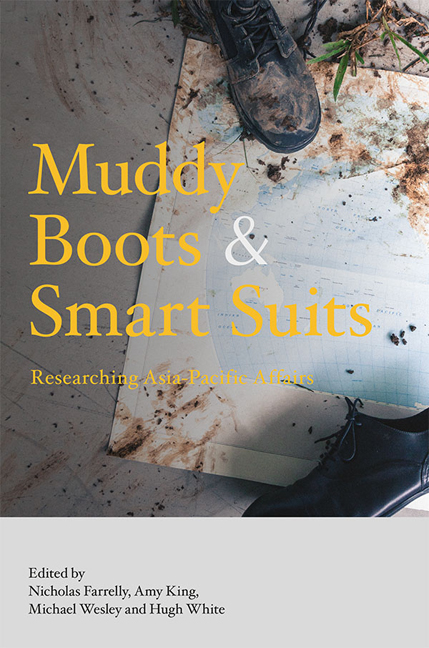Book contents
- Frontmatter
- Contents
- About the Contributors
- 1 Introduction to Research in Asia-Pacific Affairs
- Section I In the Field
- Section II Analysing Politics
- Section III Shaping a Region
- Section IV Conflict and Order
- Section V Policy and Practice
- 12 Securing the Local and the Global: The Story of Policy Engagement
- 13 Muddy Boots and Smart Suits: Practical Considerations for Research in the Twenty-first Century
- Bibliography
- Index
12 - Securing the Local and the Global: The Story of Policy Engagement
from Section V - Policy and Practice
Published online by Cambridge University Press: 12 January 2018
- Frontmatter
- Contents
- About the Contributors
- 1 Introduction to Research in Asia-Pacific Affairs
- Section I In the Field
- Section II Analysing Politics
- Section III Shaping a Region
- Section IV Conflict and Order
- Section V Policy and Practice
- 12 Securing the Local and the Global: The Story of Policy Engagement
- 13 Muddy Boots and Smart Suits: Practical Considerations for Research in the Twenty-first Century
- Bibliography
- Index
Summary
Ours is a hyper-vigilant age. Our journey through life is cushioned and buffeted by a constant stream of warnings, prohibitions and exhortations intended to make us safer. Every accident, attack, fatal disease, or tragedy is followed by a flurry of post-mortems about what went wrong and recommendations about what should be done to make sure such an event cannot happen again or at least will be much more unlikely. We refuse to be comforted by the statistics that tell us we are, on average, leading longer, healthier lives, that crime and accident rates are falling, or that extremist attacks remain very rare, and fewer and fewer of our fellow citizens can remember the last time our countries were involved in a prolonged fight to the death between powerful countries. Meanwhile, our governments believe their survival depends on reassuring us that they are doing everything they can to ensure our individual, community, and national security. And a whole ecology of research institutions — university centres, think tanks, consultants, intelligence agencies — thrive on the endless demand by governments and their citizens for reassuring research into the latest causes of their anxieties.
It is no coincidence that our hyper-vigilant age is also an age of hyper-research and hyper-information. Our society has more capacity to investigate itself and its preoccupations, and to share the results of those investigations, than ever before. Each advance in our safety and well-being yields to new anxieties and new subjects for research and risk reduction. Research into security is a major industry, an academic-policy complex that has taken its place alongside the military-industrial complex. The symbiotic relationship between security policy and security research has been much noted and discussed, though it would seem with little impact on either the research or the policymaking (Herman and O'Sullivan 1989). It is worth looking at this relationship anew, and from a different angle, to consider how security policy shapes security research and vice versa, and to make a couple of comparisons: how the research-policy nexus in the security realm compares to the research-policy nexus in the prosperity realm, and how these mutual relationships between research and policy differ from country to country. On the basis of these two brief comparative excursions, I conclude by suggesting a new, programmatic and potentially more productive relationship between research and policy in the security realm.
- Type
- Chapter
- Information
- Muddy Boots and Smart SuitsResearching Asia-Pacific Affairs, pp. 173 - 184Publisher: ISEAS–Yusof Ishak InstitutePrint publication year: 2017



